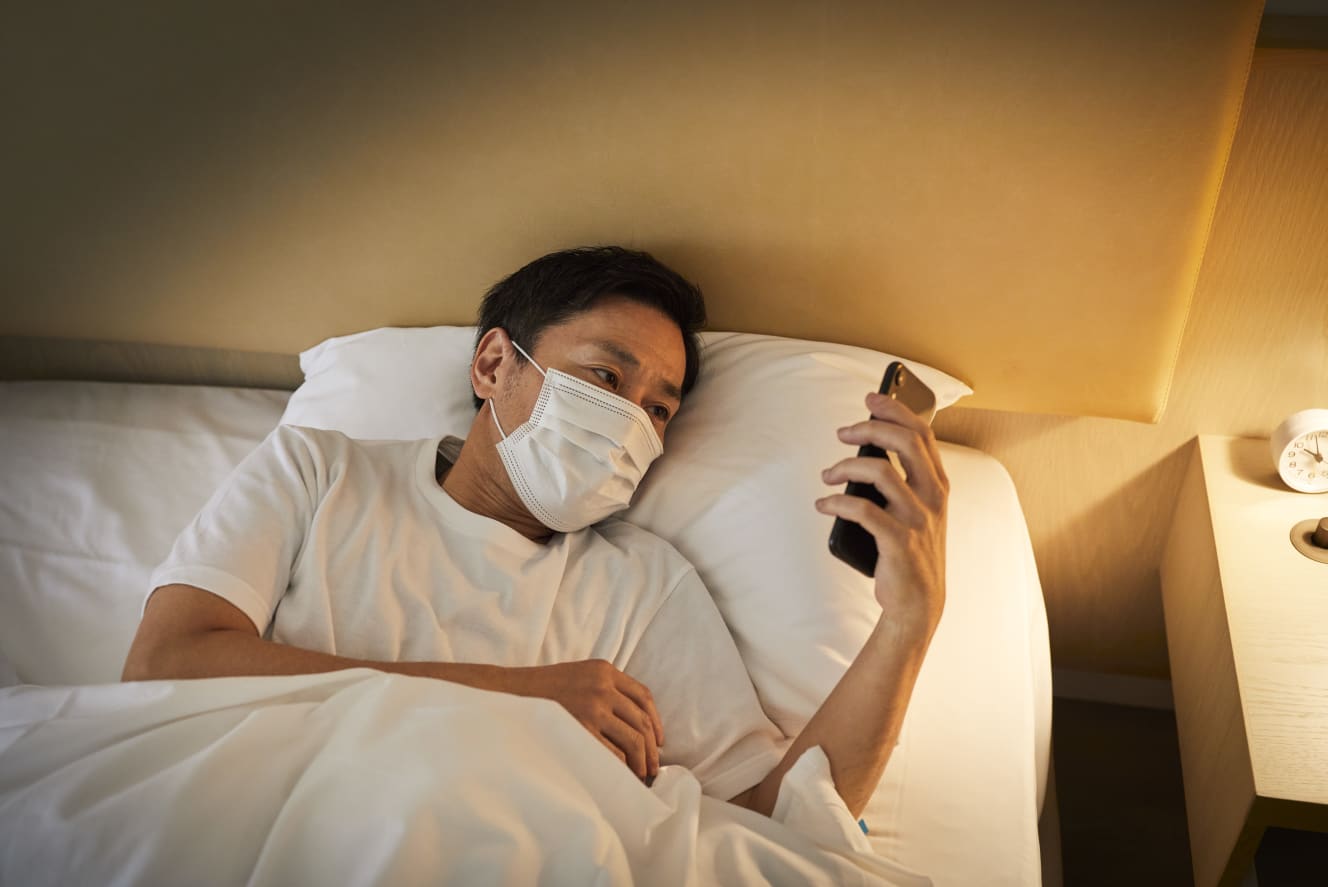Home Workers Beware…Ask an Expert How to Improve “Preliminary Sleep Disorder
Only 17.8% are satisfied with their sleep!
With the expansion of work-at-home jobs after the new coronavirus infection, sleep disorders have been on the rise. According to the “Report on the Results of the FY2021 Health Survey” conducted by the Ministry of Health, Labor and Welfare on the COVID-19 crisis, only 17.8% of respondents were satisfied with their sleep, and more than 80% were dissatisfied with the amount of time it took them to fall asleep or the number of times they woke up in the middle of the night. In addition, a “sleep disorder reserve army” was also created, in which people are dissatisfied with their sleep, but not to the extent of going to a hospital.
But what exactly is the borderline for being a pre-sleep deprived person? Are there any simple ways to improve sleep at home?
We spoke with Hidehiro Fukuda, a sleep improvement instructor who offers advice on sleep improvement and rest to a wide range of people, including the general public and professional athletes, as a specialist in “rest and recovery”.

First, check for “sleep disorder reserves
–First of all, what is the difference between a “pre-sleep disorder” and a “sleep disorder”?
Hidehiro Fukuda (hereafter, Fukuda): When it comes to a clear difference, it is a little difficult. Sleep disorder is a general term for a condition in which the inability to sleep at night interferes with daily life. There are many types, including insomnia, circadian rhythm sleep-wake disorder, sleep-disordered breathing, and sleep-related movement disorder. Symptoms and feelings vary from person to person, so it is difficult to say “if you have this symptom, you have a pre-existing sleep disorder. However, if any of the following symptoms occur “frequently,” it may be a good idea to suspect a pre-sleep disorder.
- You cannot fall asleep even after getting under the covers for more than 30 minutes.
- You have difficulty falling asleep and wake up many times during the night.
- Waking up early in the morning.
- You wake up early in the morning.
- Strong drowsiness comes on during the daytime.
- I cannot sleep because my legs feel restless.
Fukuda: The point is not “how many times” but “how often”. If it happens once or twice a month, it may be a fluke. It is whether you experience it many times, as in, “I keep waking up in the middle of the day.”
–What should I do if the above applies to me?
Fukuda: First of all, you can try using a sleep app to collect data. If you continue to score below 60, you may want to consult a specialist.

Sleep disorders among home workers have increased since Corona
–Fukuda: Is the number of people suffering from sleep disorders actually increasing?
Fukuda: I think the number has been increasing since the COVID-19 crisis. The number of interviews about insomnia and sleep disorders has increased, as has the number of consultations. Personally, I think this is a barometer of the growing seriousness of the problem in society.
–What were some of the commonalities among the increased number of consultations?
Fukuda: If I had to name one, it would be people with desk jobs. I feel that many of them suffer from difficulty falling asleep even after getting into bed, and from awakening in the middle of the day.
With commuting gone and working all morning, before you know it, you lose the separation from your personal life and go to bed later and later. It has become so routine that one day, even if you decide to go to bed early, you can’t sleep. And when I wake up in the morning, I feel somewhat unrefreshed. Because of this, work does not go as smoothly as you would like, and you end up working late into the night, which makes it hard to get up the next morning…. It seems that they have fallen into such a life cycle.

–Some people’s life cycles are disrupted by their inability to sleep, and it interferes with their work….
Fukuda: However, it is inevitable that home workers have difficulty sleeping because of the way the human body works: a day is 24 hours long, but our body clock is a little longer at 24 hours and 18 minutes. The sun, food, and exercise are the things that reset it.
When we wake up in the morning and are exposed to sunlight (2,500 lux or more), we release serotonin, a stabilizing and healing hormone. After 14 to 16 hours, this is converted into melatonin, a hormone that induces drowsiness, which naturally makes us sleepy. In the case of home workers, many of them stay at home from morning and work all day, so it is impossible to wipe out the possibility that their body clocks have become misaligned and these functions are not working properly.
-What about after work, drinking alcohol or playing games on your smartphone, and before you know it, you are asleep?
Fukuda: It’s more like “falling asleep. In that case, it may not be a good quality sleep.
How to get quality sleep?
–Because the quality of sleep is not good, you don’t feel refreshed the next day….
Fukuda: The sympathetic and parasympathetic nerves are deeply involved in sleep quality. If this balance is good, the quality of sleep will be good, and you will wake up the next day refreshed and energized.
However, most people today are in a state of sympathetic dominance for a long time, and many of them have an imbalance. This is because most people use the extra time to sleep after doing various things such as work. As we age, it becomes harder to switch from the sympathetic nervous system to the parasympathetic nervous system, so we need to consciously create a situation where the parasympathetic nervous system is dominant.
–What should we do to get a good night’s sleep?
Fukuda: I would say that you need to prepare your sleeping environment, be conscious of the amount of time you spend sleeping, and make sure to take a hot bath.
As for the sleeping environment, the ironclad rule is to use warm, soothing lighting in the bedroom and not to place your phone or computer by your bedside. If you keep bright lights on all the time, your brain will think it is daytime. Electromagnetic waves emitted from smartphones, computers, and other devices can also interfere with sleep.
The second, consciously securing sleep time, is not so difficult. For example, in my case, since I am in my 40s, about 7 hours of sleep is considered necessary. Based on that, if I wanted to wake up at 6:00 the next morning, I would want to go to bed at 23:00 the day before. Then, if you work backwards, you can make a schedule that allows you to have a bath 1.5 hours before going to bed and dinner 3 hours before going to bed, you will have enough time to sleep.

The third thing to do is to take a bath in a hot tub, which is a preparation to help you enter deep sleep. It is said that about 90 minutes after bathing, the deep body temperature drops, making it easier to fall asleep.
There are eight other key points to getting a good night’s sleep, as follows
- 1_Do not use your smartphone as an alarm clock.
- 2_When you wake up, look at the sun for at least 5 minutes. Have a Japanese breakfast if possible, and do light exercise for about 20 minutes.
- 3_If you take a nap, take 20-30 minutes before 3:00 p.m.
- 4_After evening, change the light color to bulb color or adjust the brightness of the light.
- 5__Take a bath in a 38-41 degree bathtub for 10-15 minutes.
- 6_Change into pajamas (linen, cotton, or silk) when going to bed.
- 7_Do not look at your phone before going to bed.
- 8__Do not sleep with your phone left charging under your pillow.
Fukuda: In particular, people who use their smartphones as alarm clocks should stop immediately. It is partly because it emits electromagnetic waves that may disturb sleep, but also because it is better to wake up with light than with sound, so I recommend the optical alarm clocks that are gradually increasing in number these days.
Comfortable sleep is based on a series of small things. These are things you can try right away, but you don’t have to do them all at once. It is a good idea to start with the things that are easy to do, one at a time.
In addition, there are a variety of other good sleep products on the market these days. There are many easy-to-handle items such as bath salts and aroma goods, so while keeping the points of a good night’s sleep in mind, you can start by making good use of good sleep goods to make the parasympathetic nervous system dominant.
And if you have tried the above measures but still find no improvement, you should consult a qualified sleep specialist such as a good sleep therapist or a sleep instructor.
Hidehiro Fukuda, an advisor and consultant specializing in “ rest,” “recovery from fatigue,” and “sleep.
Interview and text by: Motoko Abekawa
Motoko Abekawa is a freelance writer mainly for the web. She is also involved in the production of books and corporate PR magazines. She does not specialize in any particular field, but covers a wide range of topics that intrigue her, including history, comedy, health, beauty, travel, gourmet food, and nursing care.
Photo: Afro
